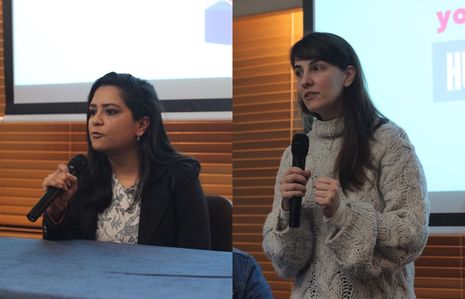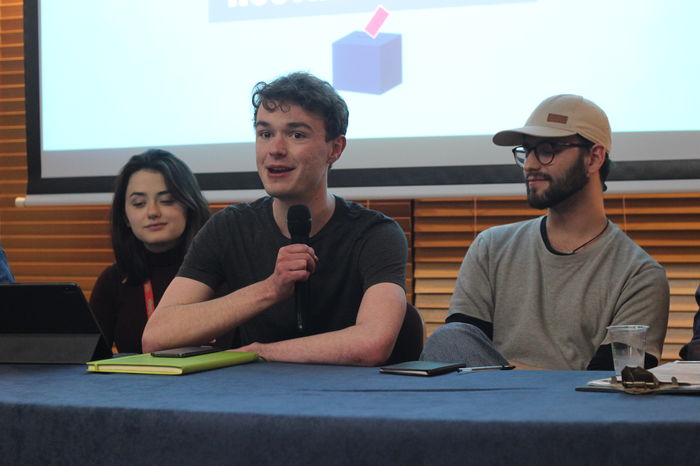Analysis: What do the Students’ Union candidates manifestos tell us this year?
The candidates all bring different levels of experience to the table, and while offering some new ideas, back similar policy proposals to those offered in previous years’ manifestos

As we enter into the final hours of voting in the Cambridge Students’ Union election race, Varsity takes a look at the candidates’ manifestos and their competing visions for student politics in Cambridge.
This year’s race for Undergraduate President of the new Cambridge SU is the most hotly contested in recent years, with five candidates aspiring to the role, compared to just two in 2019 and three in both 2018 and 2017. Predictably, there are numerous similarities in the manifestos and campaigns across the years.
Humanities students continue to dominate the field of candidates: Matt Alderton, Ben Margolis and Mimi Nandhla are all historians, while Rusty Smith studies HSPS. Henry Wright, a computer scientist, is one of only three CUSU presidential candidates in the last four years to have studied a STEM subject (Shadab Ahmed, who ran in 2019, and Keir Murison, who ran in 2017, both studied Natural Sciences).
Every other candidate since 2017 has studied either HSPS or History; in 2018 all three candidates were third-year HSPS students. Most notably, every CUSU President since 2016 has studied HSPS.
Experience on college JCRs and faculty boards is also, predictably, an aspect common to nearly all the presidential candidates in recent years. Alderton and Wright have both served as vice-presidents of their respective college JCRs (Magdalene and Homerton), while Margolis and Smith have been faculty board representatives. Three of the past four CUSU Presidents (Edward Parker Humphreys, Daisy Eyre and Amatey Doku) have been JCR presidents at Jesus College, and several other candidates have served on JCRs or as faculty representatives.
The 2019 election saw little major policy differences between the two candidates: Ahmed and Parker Humphreys broadly agreed on many of their respective positions, such as supporting Cambridge Cut the Rent, divestment, and access initiatives, opposing the Prevent duty and committing to increasing welfare support and decreasing the living wage within colleges.
Margolis, a core organiser in Robinson Cut the Rent and Robinson Living Wage campaigns, has mentioned all of the above issues in his manifesto, as well as pledging to lobby against the use of confidentiality agreements in sexual misconduct disciplinary procedures – a subject under increasing scrutiny at Cambridge. He also wishes to “standardise bursary funding across colleges.”
Several of Parker Humphreys’ other manifesto policies have been adopted by some of the 2020 candidates. Henry Wright has pledged to bring back a U-Bus service to serve Homerton and Girton directly, and embark on a “college roadtrip” to visit all colleges during Freshers’ Week. Parker Humphreys similarly promised to lobby for changes to the U-Bus, and made the slightly less ambitious commitment to visiting every college every term. Both Parker Humphreys and Wright pledged to reform CUSU Council to increase participation and scrutiny. Additionally, Margolis has adopted Parker Humphreys’ idea of giving all students free Wednesday afternoons, and has extended this proposal to include a ‘reading week’ in Week 5 of every term. Wright also backs the introduction of a reading week.
While last year’s election did not feature a candidate who structured their campaign around advocating significant changes within CUSU, this year there are several.
Matt Alderton has adopted the slogan “Devolve and Depoliticise”, arguing that “CUSU no longer effectively represents students and it needs fundamental reform.” He proposes holding a referendum on the NUS, reducing the pay of Cambridge SU sabbatical officers and reforming the voting structure of CUSU Council to give more power to JCR and MCR representatives.
Henry Wright has also styled himself as a candidate for change, calling for an end to Cambridge SU “policies about non-student national issues we can’t change” and enforced positions on issues like strikes, and proposing similar CUSU Council voting reforms to Alderton. Rusty Smith has also tried to present himself as an ‘outsider’ candidate, describing himself in his manifesto as a “relative outsider to the SU”.
The new SU may be hoping that the role of Postgraduate President is more high-profile. There are only two candidates for this role: Luisa Deragon, who is in the final year of her PhD in Biological Sciences at Girton, and Aastha Dahal a PhD student at Criminology in St Edmund’s.
Both cited the need to address staff-student relationships. Deragon cites in her manifesto the challenges she faced when having to change her lab and supervisor during her third year. She wants to prioritise resources that improve student-supervisor relationships by working with the “University Colleges and Departments’ on “how to navigate challenges and find solutions in a sensitive way to all involved.” Dahal wishes to make training “for graduate supervisors mandatory to introduce a minimum basic standard of care in supervisor-student relationships.”
Their two manifestos also mentioned student funding. Dahal wishes to lobby “for all scholarship funds administered by the university to automatically cover visa costs for international students″, and to work to improve funding “availability and distribution”, particularly “including institutionalising funding support for 4th year PhD students.” Deragon highlighted looking into sources of “secure funding”, to “find pragmatic solutions and establish no less than short-term solutions for when students run into ‘money problems’”.
Dahal has cited other activist causes in Cambridge, with her platform more in line with Margolis’. She said that she wants the culture of the SU to be “one of fearless activism against the marketisation and commodification of university education”, and stressed reforming sexual assault and harassment procedures, knowledge sharing between different groups looking to decolonise the curriculum, improving access to mental health services, as well as campaigning for “fair and equal housing, rent and living expenses.”
Deragon plans to advocate for better student work-life balance, and to organise “diverse social events to promote inclusion and renew bonds in our community.” She also wants to do more work to ‘identify’ “current, prevailing issues graduate students face”, looking towards “debates, surveys, or targeted campaigns, followed by intense investigation on strategies”. She also hopes to work with the SU’s liberation campaigns, and hopes that the SU will “support and guide students” facing harassment or discrimination.
With just a few hours left to vote, Varsity encourages those who have not yet done so to read the candidates’ manifestos and then exercise their democratic right in the online ballot.
 News / Judge Business School advisor resigns over Epstein and Andrew links18 February 2026
News / Judge Business School advisor resigns over Epstein and Andrew links18 February 2026 News / Hundreds of Cambridge academics demand vote on fate of vet course20 February 2026
News / Hundreds of Cambridge academics demand vote on fate of vet course20 February 2026 News / Petition demands University reverse decision on vegan menu20 February 2026
News / Petition demands University reverse decision on vegan menu20 February 2026 News / CUCA members attend Reform rally in London20 February 2026
News / CUCA members attend Reform rally in London20 February 2026 News / Gov grants £36m to Cambridge supercomputer17 February 2026
News / Gov grants £36m to Cambridge supercomputer17 February 2026











